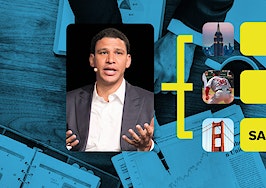Compass CEO Robert Reffkin has had a big year, to say the least.
The company he co-founded in October 2012 with Ori Allon has raised more than $1 billion in the past 12 months while expanding into more than a half-dozen new markets, introducing futuristic for-sale signage, doubling its agent count to 7,000 and rattling the real estate industry as a whole.
In a wide-ranging interview in a conference room in Compass’ Manhattan headquarters on Friday, Reffkin reflected on his company’s growth over the past six years, the state of the industry, his support for multiple listing services, plans to go public and criticism of the brokerage’s recruiting practices.
He also acknowledged regret for the company’s past marketing strategies, which, he admitted, frequently verged into braggadocio.
“I think the language from the marketing became about being everywhere and winning,” Reffkin told Inman. “And there’s nothing about my motivation that has to do with winning or being everywhere.”
The full interview, edited lightly for clarity and length, is below.
As you look back, are you satisfied with the rate at which Compass has grown?
I’m happy with the rate that the company’s grown. Most importantly I’m happy with how our agents feel about the company. I think it’s really building the community out with our agents across the country that are working together that are supporting each other. To me, it’s what gets me emotional joy, it’s what I’m most happy about.
Compass has been jabbed over its agent productivity numbers by MoxiWorks. Can you defend your agent productivity record? Are agents more productive when they come to Compass?
I know they are.
What allows agents to be more productive when they come here, versus their past brokerage?
So 89 percent of the average agent’s time is spent on non-core administrative and arts and crafts tasks, which are taking away from their clients and their families. We give them more support and more tools and they get more time.
When you have more time, you’re able to spend more time with your family and more time with your clients. We have much more support than the average brokerage firm. We just invested in a now 200-person marketing and advertising agency across the country spread through local offices.
We have an agent operations group of almost 100 people. We have IT in virtually every office that can help with computers. We have a higher ratio of sales managers to agents than the traditional brokerage firm.
What about Compass’ technology platform separates it from RE/MAX or Keller Williams, or what an agent can get from third-party vendors?
As a general matter, I don’t really talk about competitors or other companies that talk about us. But I’m happy to share our technology. The average agent has to log into over 10 companies to do their job and there are all these different systems and all these different places. Here at Compass, we build and recreated a lot of those systems so there’s only one login.
Let me give you an example. If you’re an agent at a different company, you have a customer relationship management platform that’s a different login, you have a digital newsletter that’s a different login, a brochure creator that’s a different login, you have your Facebook ad campaign that’s a different login, you have your social media creator that’s a different login, where you do your searches is a different login, your open house app is a different login.
At Compass – and I can go down the list because there are others – there’s one single space. The number one thing agents ask for is time and it’s how are you going to give them that time? When you don’t have to log into so many different sites, it gives you that time.

Credit: Compass
What do you think about the rise of iBuyers? Has Compass given thought to launching an iBuyer platform or partnering with one?
I think that almost every disruptive tactic that companies use to displace agents can be given to agents to empower them, that’s a general view I have.
From that perspective, the model of iBuyers is something that I do look at. I don’t see a world where more than 10 percent — even in the best case, 20 percent of people — are going to want to sell their homes [to an iBuyer], that would never be our primary focus. But with everything we do, we just ask agents what they want. And then we build around their ideas.
What’s the strategy behind international expansion? Can you reveal where Compass is headed?
The most important button on the site is a button called “feedback.” You can only see it if you’re an agent. This is where agents put in the best of their ideas and then they rate them up or down.
For example, someone put in, “I want a Yelp-like system for vendors for Compass, for real estate search providers,” and 261 people said, “Yes I want that.” So, now it’s under review. [Other categories include] technology features, marketing, support, community and culture, new cities and regions and office space.
The reason why we decided to go international is that we got a lot of feedback because people want to be able to tell sellers that they can bring in buyers from other cities. And so right now, we’re surveying our agents to see which international cities they want to go to. All of the cities that we’ve gone to have been selected by our agents; they have not been selected by us.
I think there’s in a way a bit of a misconception about what Compass is. We’re not a company run by investors, managed out in New York. We’re a company run by agents, managed out of every local office. In order for anything to happen, it has to get into that feedback button. If agents aren’t saying, “this is what we want,” we don’t do it.
Who do you see as Compass’ biggest competition?
I don’t think about competition in that way. I think our greatest competition is ourselves. That’s the way I was raised. Not to look to the left or the right, just focus. This is a very dynamic market with a lot of different stakeholders, I don’t think one is more competition than another.
Compass is going to get to 20 percent of market share in the top 20 cities by 2020. It’s definitely going to happen. We are going to work harder for agents than any other company in this country because we have almost $1 billion in cash, we have zero debt. Nobody will ever take money back from the company.
They have shares in Compass like shares in a public company. And it gives us the privilege to be able to invest more in their ideas than any other company in the history of this country.
If you were an agent – my mom has been an agent for the majority of my life – there’s no place for them to say, ‘I have a really big idea and it’s going to cost a lot of money, can you help me?’ They can’t go to the aggregator and say, ‘Can you help me?’ They can’t go to the discounters and say, ‘Can you help me?’ They can’t go to the iBuyers and say, ‘Can you help me?’
Brokerage firms have a very important place in the world, particularly [with regards to] community and culture, but they just don’t have the resources. I’m committed to building for agents and making their lives better than they ever thought was possible.
I don’t know if I have the answers but I know they do. If every agent has different great ideas and they put them in the system and all vote up, then they will create the future. In a way, we’re like a venture capital firm backing their ideas in every local region.
As you know, we recently launched the agent betterment fund. We’ve given out over $15 million dollars of interest-free loans to agents. We gave out three loans that were $1 million each for people to grow their business. We’ll hire assistants for agents to help them grow their team. We’re definitely not just a technology company.

Robert Reffkin speaks at the Inman Connect NY 2018 conference. Credit: Kailya Warren/Inman
Do you think it’s unfair to say Compass has been very aggressive in recruiting? Do you defend the business model of trying to hire away or recruit top agents in every market?
I don’t think you can recruit customers. And I think the industry’s view that agents can be recruited reflects their misunderstanding that the agent is a customer and not an employee.
I think historically, agents have been treated by brokerage firms as employees but not given benefits. If they were employees, I would say, that’s correct, but that’s not. They’re independent contractors and they are paying the company. The only people that pay brokerage firms are agents. If you’re paying somebody, you’re by definition the customer and I don’t think you can recruit customers.
What do you think the best way to achieve your market share goal is: through more acquisitions or through more recruiting.
The majority of the growth will continue to be by agents coming on as individual teams and individual agents. But we’re also, as you can see, starting to focus on acquisitions as well.
What do you look for in a company that you’re going to acquire?
Culture’s the most important thing – and leadership. And also asking agents in the company, ‘Do you think this is a company that you’d be proud of to be in our company?’ But nothing matters more than culture.
Is Pacific Union International the biggest acquisition you will make this year? Do you see more acquisitions of top-25 companies?
I don’t know yet. There’s no one that we’re actively talking to that’s as big as Pacific Union. But to be clear, I much prefer to hire every agent one-on-one as I did for the first several years. Because that’s better for culture.
But I do believe that the industry is going to continue to change and as fragmented as the brokerage firms are, with 86,000 brokerage firms in the country, it’s more important today than it was in the past to have strength in one company to support the agents. That’s an important reason for mergers.
I don’t call them acquisitions because I don’t think they are. You can’t buy brokerage firms. Their owner has to want to merge with you. They’re taking the best of their ideas and the best of your ideas and merging them together. I think bringing the best of two different worlds together is better for the agents.
A lot of the things we’re contemplating launching are from the companies we’ve merged with. Pacific Union’s Private View, for example, is a great example of something we’re going to launch because it was a great idea they had.
Does Compass have plans for a recession? How will you support agents through a market downturn?
I think the market is starting to soften in the majority of markets we’re in. Warren Buffet said, “when the tide goes down, you see who’s not wearing any pants,” and I think the same will be true in this industry. But in a downturn, we’re going to invest more. And the support that we have, using the Compass tools will be even more important in a downturn.
Are there trends in this industry people should pay more attention to?
That the average split has increased 5 percent in the last five years for the largest brokerage firms in the country. I think that’s something that I’m surprised people don’t talk about. Wall Street talks about it, but we’re not. If you look at a chart of where splits were when my mom started at 50/50 or 60/40 and where they are right now [Reffkin laughs].
It’s not reversing. The only question is, will it stop? The issue is that agents have out-entrepreneured the brokerage firm. All the talent, all the effort, all the new ideas, all the creativity has been on the agent’s side. And so the agents ask themselves, ‘For the money that I’m giving you every year, what am I getting?’ And when people don’t like that answer they say, “I’m not going to pay you as much.” And now brokerage firms are offering less and less and less. In some markets, it’s almost like a landlord and tenant relationship.
The second one is discounting at the commission level. I think there’s a little talk about that. But that’s a big issue.
And the third is that agents are starting to operate their business on sites that are not the MLS more than the actual multiple listing service (MLS) and that’s not a great thing. When you use something you make it better, with your actions, with your activity. And the MLSs have a very important role, you want them to be stronger.
The majority of markets that I see, the MLS has less inventory than sites that are not the MLS. So if that’s true, people are not going to search the MLS — they’re going to search a different site. I think it’s really important to support MLSs right now and to invest more money into MLSs and make them stronger. They play an important role for the brokerage community.
If every MLS was the best it could possibly be, it would be a really good world for agents. Where MLSs are stronger and have better data quality, agents have more time and are successful. And where MLSs have poor data quality and aren’t invested in as much, it’s harder for agents. In San Francisco, Craigslist has more than two times as many leases on it as the MLS, so nobody will search the MLS for leases. We don’t want that to happen in sales across every market.
Are there are any plans for a Compass IPO in the near future?
Compass will likely go public, but not in the near future.
Looking back since you founded Compass, are there any decisions you regret or things you wish you handled differently?
I think I would have recognized earlier the tone of the marketing language coming out of Compass. I think it was arrogant and didn’t reflect the values I hold as an individual or any of the motivations that I or the company had. I think the language from the marketing became about being everywhere and winning and there’s nothing about my motivation that has to do with winning or being everywhere.
I figured that out over the summer, I started seeing all this marketing and I’ve told everyone in the company that we can’t have any language about winning, about being the best, about being everywhere, about being better than somebody else.
That’s not who we are as a company. That’s not who I am as a person. I think perception matters and working collaboration with a community matters a lot. I think it caused a lot of harm and I wish that wasn’t the case.














